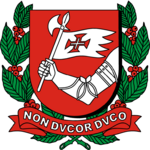Foreign relations of Belmonte: Difference between revisions
No edit summary |
mNo edit summary |
||
| Line 35: | Line 35: | ||
===Euclea=== | ===Euclea=== | ||
===International organizations=== | ===International organizations=== | ||
* {{flag|Community of Nations}}<br>[[Kesselbourg City]]: Permanent mission | |||
* [[Asterian Forum for Development and Cooperation|Asterian Common Market]]<br>[[San Pietro, Imagua and the Assimas|San Pietro]]: Permanent mission | |||
* [[International Council for Democracy]]<br>[[Morwall]]: Permanent mission | |||
* [[International Trade Organization]]<br>[[Spálgleann]]: Permanent mission | |||
* [[Global Institute for Fiscal Affairs]]<br>[[Keisi]]: Permanent mission | |||
==Missions in Belmonte== | ==Missions in Belmonte== | ||
===Asteria Inferior=== | ===Asteria Inferior=== | ||
| Line 41: | Line 46: | ||
===Euclea=== | ===Euclea=== | ||
==Policy positions== | ==Policy positions== | ||
===Climate change=== | |||
[[File:Maurino discursando.jpg|thumb|right|200px|Former [[Premier of Belmonte|premier]] [[Rita Maurino]] talking about cimate change at an economic conference in [[Guanabara]] in 2017.]] | [[File:Maurino discursando.jpg|thumb|right|200px|Former [[Premier of Belmonte|premier]] [[Rita Maurino]] talking about cimate change at an economic conference in [[Guanabara]] in 2017.]] | ||
The first mention of climate change from the Belmontese government came in 1988, during the premiership of Félix Bragança, in which it was declared that the country "should, in the next years, find ways to reduce its contribution towards climate change and environmental degradation." Since then, every government supported further international cooperation to stop climate, with Belmonte itself being the place for several climate conferences to deal with the issue. | |||
===Refugees and asylum-seekers=== | ===Refugees and asylum-seekers=== | ||
accepts | {{main|Immigration to Belmonte}} | ||
Belmonte received almost four million immigrants throughout its history, from colonial times to the present day. Many of these immigrants came from Euclean countries, the majority being Iustians, Auratians, Poveglians, Vespasians, Weranians and, to some lesser extent, Gaullicans, Hennish, Caldish and Estmerish peoples as well. There were also large immigrant groups from Senria and Xiaodong, as well as Bahian peoples who were forcefully emigrated from their continent to become slaves. Given Belmonte's multicultural and misceginated people, there is no immigration barriers or quotas whilst the law accepts any refugees and asylum-seekers that flees its country of origin due to persecution on account of its colour, religion or ethnicity, with said refugees being able to apply for Belmontese citizenship. | |||
With the refugee crisis caused after the outbreak of the Mariranan Civil War, circa fifty thousand people sought asylum in Belmonte. | |||
===Mariranan Civil War=== | |||
supports the military government i guess? | |||
===Tsabaran Civil War=== | ===Tsabaran Civil War=== | ||
supports the federal government and the return of the old system idk which one | supports the federal government and the return of the old system idk which one | ||
Revision as of 03:59, 23 November 2020
 |
|---|
| This article is part of a series on the politics and government of Belmonte |
Belmonte is one of the most important political and economic powers of Asteria, having a strong influence over decision-making in the region. The Secretary of Foreign Affairs is responsible for leading Belmontese diplomatic efforts throughout the world, with its foreign policy reflecting Belmonte's position on the international stage as it is centred around core national interests such as national security, anti-terrorism and economic multilateralism while using a soft power approach.
Belmonte is considered to be a regional and middle power and is closely aligned with Halland and the Euclean Community on a variety of issues whilst having positive relations with the majority of nations in the world, especially on the areas of economic cooperation and finances.
International organization memberships
| Organization | Ambassador to | Joined |
|---|---|---|
| Community of Nations | Michel Lemos | 1935 |
| Asterian Common Market | César Krampf | 1987 |
| International Council for Democracy | Teresa Rodrigues | 1938 |
| International Trade Organization | Filipe Gusmão | 1995 |
| Global Institute for Fiscal Affairs | Marcos Braga | 2001 |
Belmontese missions abroad
Asteria Inferior
Asteria Superior
Coius
Euclea
International organizations
 Community of Nations
Community of Nations
Kesselbourg City: Permanent mission- Asterian Common Market
San Pietro: Permanent mission - International Council for Democracy
Morwall: Permanent mission - International Trade Organization
Spálgleann: Permanent mission - Global Institute for Fiscal Affairs
Keisi: Permanent mission
Missions in Belmonte
Asteria Inferior
Asteria Superior
Coius
Euclea
Policy positions
Climate change

The first mention of climate change from the Belmontese government came in 1988, during the premiership of Félix Bragança, in which it was declared that the country "should, in the next years, find ways to reduce its contribution towards climate change and environmental degradation." Since then, every government supported further international cooperation to stop climate, with Belmonte itself being the place for several climate conferences to deal with the issue.
Refugees and asylum-seekers
Belmonte received almost four million immigrants throughout its history, from colonial times to the present day. Many of these immigrants came from Euclean countries, the majority being Iustians, Auratians, Poveglians, Vespasians, Weranians and, to some lesser extent, Gaullicans, Hennish, Caldish and Estmerish peoples as well. There were also large immigrant groups from Senria and Xiaodong, as well as Bahian peoples who were forcefully emigrated from their continent to become slaves. Given Belmonte's multicultural and misceginated people, there is no immigration barriers or quotas whilst the law accepts any refugees and asylum-seekers that flees its country of origin due to persecution on account of its colour, religion or ethnicity, with said refugees being able to apply for Belmontese citizenship.
With the refugee crisis caused after the outbreak of the Mariranan Civil War, circa fifty thousand people sought asylum in Belmonte.
Mariranan Civil War
supports the military government i guess?
Tsabaran Civil War
supports the federal government and the return of the old system idk which one
Haland
belmonte is a hallandic bitch since 1935, but it is starting to take its own foreign policy since the 80s whilst maintaining very close relations
Maracao
ok relationship before the commie revolution to total isolation and closing of embassies once commies got in power. supported alongside halland and nuxica the movimento azul and the 1980 coup d'état. relations have becoming better since the 1990s but it still very cold
Chistovodia
same as maracao tbh, but slightly better
